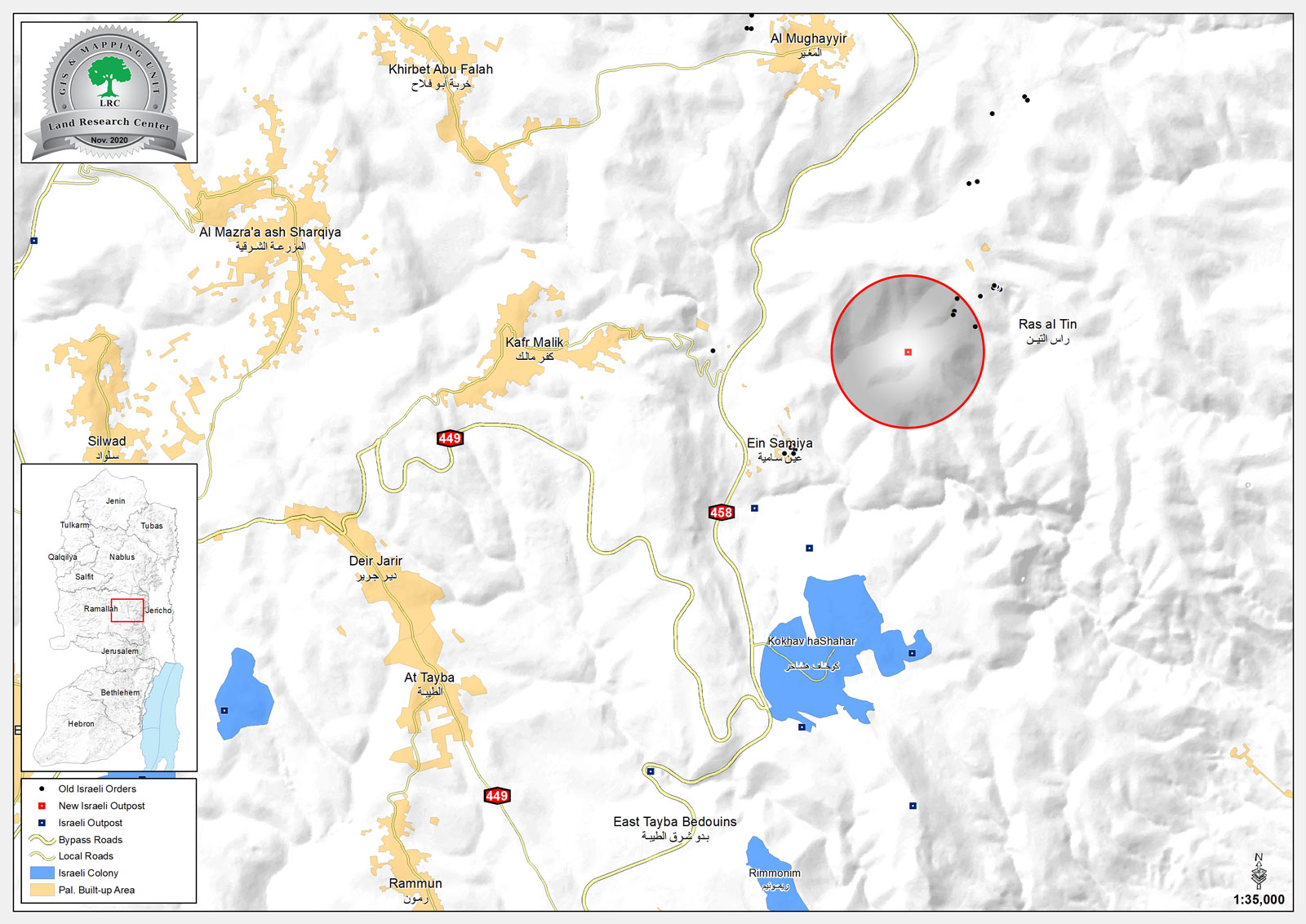Related
Establishment of a new colonial outpost on lands of Kafr Malik village in Ramallah governorate
Violation: the establishment of a new colonial outpost.
Location: Ras At-teen - Kafr Malik / Ramallah and Al-Bireh Governorate.
Violation date: 04/11/2020.
Perpetrator: a group of settlers.
Affected people: Bedouin from Al Ka'abneh tribe.
Violation details:
On the morning of Wednesday, November 4, 2020, a group of settlers began establishing a new colonial outpost in the "Ras al-Tin" site, east of the village of Kafr Malik in the Ramallah governorate, and close to the al-Ka'abina Bedouin community.
It is noteworthy that the field research team at the Land Research Center monitored that colonial outpost consisting of two tents for housing and a barrack for raising sheep, which was built on an area of about 4 dunums of unused agricultural land claimed by the Israeli occupation authorities to be state land . The colony of "Kokhab Hashheer" is the closest to that new outpost, as this new outpost is located 1400 meters away from it.
a view of the new colonial outpost set up in the middle of the Palestinian land of Kafr Malik
It is noteworthy that the establishment of this colonial outpost has had a great impact on the lives of the Bedouin population living in that region, as the head of the Bedouin community in the Ras al-Tin area, Sheikh Salama al-Ka'abneh, told the Land Research Center researcher the following:
"It is not unlikely that the colonists, after establishing that outpost, would resort to confiscating pastures and closing the area in the face of the Bedouin population, as they did in previous and various locations, noting that the Bedouin homes are only 150 meters away from that outpost, and after the establishment of this colonial outpost, the Israeli occupation increase pressure on us to expel us from our current place of residence, and allow the expansion of this colonial outpost. "
For more than 25 years, the Ras al-Tin area has been inhabited by approximately 30 Bedouin families from the Al Ka'abneh clan, under difficult economic conditions, and in a simple life devoid of any services or even the means for stability. And recently the occupation began to restrict them and prevent them from building or expanding, for example, more than 12 families were notified to stop work in their residential and agricultural facilities last summer, and they even received a notice to stop work in the only school that serves the community's children.
During the past three years, the field research team at the Land Research Center has observed an intensive activity on the part of the colonialists to establish colonial outposts of an agricultural nature specifically in the eastern Ramallah desert, and particularly in the vicinity of the settlements of Rimonim, Kochab Hashhair, and Adi Ad. Indeed, these settlements were originally established with the aim of creating a system to control pastures and force the Bedouin population as well as the farmers and land owners to leave the area completely in preparation for the seizure of vast areas estimated at hundreds of dunams, which extend eastward to the Al-Auja area in the Jordan valley.
Kafr Malik village:
The village of Kafr Malik is located 15 km to the northeastern side of the city of Ramallah, and it is bordered to the north by Khirbet Abu Falah and the village of Mughayer, to the west by the village of al-Mazra'a al-Sharqiya, to the east by the villages of Mughayir and al-Auja, and to the south by the village of Deir Jarir.
Its population is (2,946) people, according to the 2017 census.
Its total area is 51,891 dunums, of which 911 dunums are a built-up area of the village.
So far, the total of 1645 dunums of the village land were confiscated as shown below:
* 380 dunums for the establishment of the colony of "Kochav Hashahar" in 1977, which is now inhabited by about 1,367 settlers;
* 2.726 dunums for the construction of Bypass Road No. 458;
* 539 dunums for establishing camps for the occupation army.
The lands of the village are classified according to the Oslo Agreement to:
- Area B (6,574) dunums.
- Area C (45,317) dunums.
(Source: Geographical Information Systems Unit - Land Research Center).
Legal commentary
The process of establishing random colonial outposts and expanding Israeli colonies at the expense of the Palestinian territories carried out by the Israeli colonial councils with the support of the occupation government in all the settlements established in the West Bank is a clear and explicit violation and violation of many basic systems of international humanitarian law, including Security Council resolutions and the The Hague Convention of October 18, 1907 relating to the respect of the laws and the Fourth Geneva Convention Relatied to the Protection of Civilian Persons in Time of War of August 12, 1949, and in particular:
• Resolution No. 242 of 1967: which calls for the withdrawal of the Israeli armed forces from the lands they occupied in the year 1967, and affirms the inadmissibility of seizing lands by war, and the need to work for a lasting and just peace in which every country in the region can live in safety
• Resolution No. 446 of 1979, which affirmed the illegality of the Israeli settlement policy in the occupied Arab lands, including Jerusalem, and considered it a dangerous obstacle to peace in the Middle East.
• Resolution No. 452 of 1979: In which the Security Council calls on the Israeli occupation authorities to stop settlement activities in the Palestinian territories it occupied in 1967, including Jerusalem.
• Resolution No. 465 of 1980: which demanded that Israel cease settlement construction, refrain from building new settlements and dismantle those established at that time, and also demanded member states not to assist Israel in building settlements.
• Resolution No. 478 of 1980: Calling for non-recognition of the "Basic Law" on Jerusalem and calling on states to withdraw their diplomatic missions from it.
Hague Agreement / 1907:
• Article 46: The occupying state has nor right to confiscate private property.
• Article 55: The occupying state is considered as a manager of lands in the occupied country, and it must treat the country's property as private property.
Fourth Geneva Treaty / 1949
• Article 49: The occupying power has no right to transfer its citizens to the lands it occupied, or to take any measure that leads to demographic change there.
• Article 53: The occupying forces shall not have the right to destroy individual or collective personal property, individuals, state, or any authority in the occupied country.
• Article 147: The destruction and appropriation of property in a manner not justified by military necessities and on a large scale in an unlawful and arbitrary manner is a grave breach of international law. .

This report is part of SPLHR project activities
This report was made with EU funding, The contents of this document do not reflect positions and views of the EU


